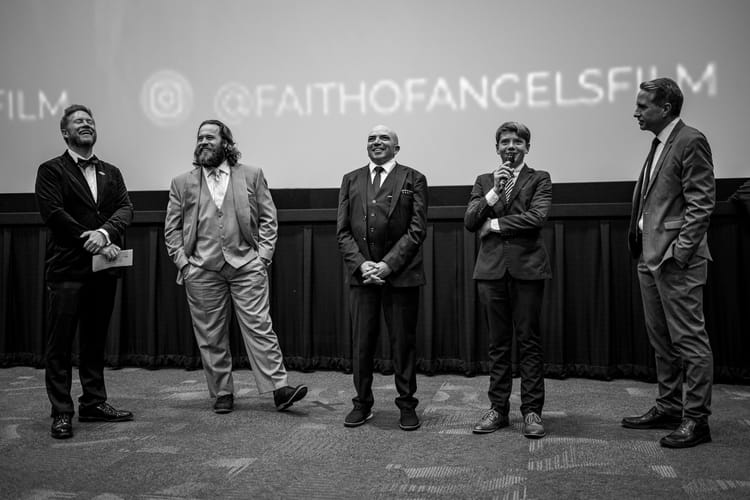Where We Are In The Cycle

Where are we now?
Understanding the Fourth Turning isn't just academic. Each generation plays a specific archetypal role that creates unique storytelling opportunities. For media creators and investors, recognizing these patterns reveals why certain stories resonate and what content will thrive during a crisis.
Through generational theory, our historical moment comes into focus. We’re in the shadows of the Fourth Turning, the winter season of an 80-year cycle that has repeated throughout Anglo-American history.
Our cycle started after WWII around 1946. We're in the Fourth Turning, or "crisis" era, that began with the 2008 financial crisis.
Each turning lasts 20-25 years. So, if history repeats—or rhymes—we're in for a doozy the next couple years. We're 16 years into a 20-25 year crisis turning, which historically ends in wars or major events before starting a new High. Neil Howe, author of The Fourth Turning and The Fourth Turning Is Here, predicts the crisis climax around 2025-2030, with potential triggers including economic instability, political polarization, or international conflict.
What makes this framework more than academic curiosity is how precisely the generational archetypes play their historical roles. For filmmakers, understanding each generation’s position in the cycle is essential:
- Boomers (born 1946-1964) are the principled, moralistic elders imparting wisdom and values.
- Gen X (born 1965-1980) is stepping into pragmatic leadership as institutions need survival-oriented solutions.
- Millennials (born 1981-1996) are becoming the team-oriented power generation—the "Hero" archetype during a crisis.
- Gen Z (born 1997-2012) is being shaped by this crisis as they come of age, developing the "Artist" archetypesensitivities.
This generational alignment creates unique storytelling opportunities and challenges that echo patterns from previous Fourth Turnings. Look at today’s studio system, run by elder Boomers, with movies produced by Gen X-ers, written and directed by Millennials and Gen Xers, and crew from Gen Z and Millennials. You see how the generations work together—and against each other—to create today’s landscape.
Historical Context for Today's Stories
In The Fourth Turning, Howe and Strauss show how each generation's stories differ due to their upbringing. In the last crisis era, films like "Gone With the Wind" and "The Wizard of Oz" captured uncertainty and hope. These were not mere entertainment, but cultural touchstones that helped Americans process collective trauma and envision renewal. Today's crisis-era storytelling includes apocalyptic narratives alongside resilience stories, but both serve the same psychological function.
Consider our current cultural landscape. The Last of Us focuses on found family amid societal collapse. Dune exploresprophecy and destiny in a decaying empire, despite being written by Frank Herbert, a Greatest Generation (1920), Hero archetype, and released in 1965 during the transition from the High to the Awakening. Oppenheimer examines the moral weight of civilization-altering decisions. These aren't random topics. They're crisis-era narratives that help us process our moment.
Recognizing each generation's position in this cycle helps us craft resonant content. The Boomer nostalgia for their highera, Gen X's cynical pragmatism, Millennials' focus on collective action, and Gen Z's coming-of-age anxiety provide rich material for stories that connect with audiences across generations.
Authenticity Through Generational Perspective
While transcendent works can cross generations (see: Dune), there's a special authenticity in writing within one's generational experience. Lean into your lived experience. When they say, "write what you know," it's not just to write your stories, but to share your worldview.
Sharing your generational experiences helps you resonate with others who "get it." This authenticity explains why Stranger Things (written by Gen Xers about their childhood) feels genuinely nostalgic rather than performatively retro, or why Girls (written by early Millennials) captured a specific malaise that older writers missed. This doesn't mean you can't write characters from other generations. Intergenerational stories are powerful when done authentically. It means recognizing the unique lens through which each views the world. The most compelling narratives acknowledge these differences while finding universal human experiences that connect across generations.
Films that bridge these generational perspectives will resonate during this Fourth Turning, as we navigate through crisis toward a new normal. Rather than try to make a movie for everyone (which rarely works unless you’re a studio with a massive budget), make something specific. Speak to your generation in ways only you understand…except Gen A. Wedon’t need more slang older generations don’t understand ;)
What to do about it...
If you're an investor looking to champion indie stories and voices, understanding generational dynamics can help you identify authentic projects for specific audiences. Films capturing the current crisis zeitgeist while offering hope may find receptive viewers. Consider Everything Everywhere All at Once, produced for ~$20m, which captured our multiverse moment while offering genuine hope—and generated extraordinary returns for A24 ($143m+ box office).
For marketers and distributors, it is valuable to recognize how different generations consume media. Boomers prefer traditional platforms, while Gen Z gravitates toward bite-sized, shareable content that acknowledges their uncertain future and provides community connection. The most successful distributors will develop strategies that account for these differences rather than applying one-size-fits-all approaches.
Gen X producers have an important role in the Crisis era. Our skepticism and pragmatic approach suit uncertain times. We bridge the gap between Boomer wisdom and Millennial idealism, creating projects that balance realism with hope. Theyunderstand resource constraints and make tough decisions while maintaining creative integrity. We grew up as latchkey kids during institutional decay, so we know how to work without supervision, navigate broken systems, and build something valuable from scraps. These traits are generational adaptations that make us qualified for this moment. Our ability to work independently within broken systems equips us to shepherd stories through this Fourth Turning's turbulent landscape.
The Fourth Turning offers unique storytelling opportunities if you understand our position, regardless of your role in the media landscape.
Finding Opportunity During Crisis
Yes, we're in a crisis. The world is uncertain and changing daily. Leaders and institutions are failing us, our political landscape is divided, and we don't know how much worse it will get before it gets better.
But…
If we build during the storm, we'll be better positioned for the next high. If we make progress every day, we'll be further ahead when the light breaks through.
Remember that every significant period of American filmmaking emerged during or after a crisis. The studio system solidified after the Great Depression. The New Hollywood renaissance followed Vietnam and Watergate. The streaming revolution gained momentum after the 2008 financial crisis.
Opportunities exist, even now. There's abundance if you look. The question isn't whether our industry will be transformed. It will be. The question is whether you'll build the next paradigm or cling to the last one.
Next Chapter








Member discussion